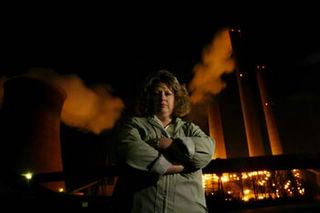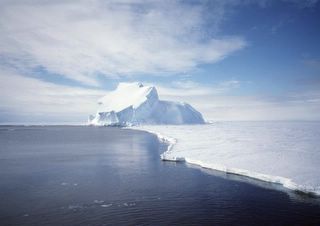
Beth Skabar/Athens News Photographer
Elisa Young, a resident of Racine, Ohio, stands in front of American Electric Power's Gavin power plant, a coal fired facility in Gallia County. Young, a member of the SierraClub's executive committee, is concerned about the impact of the coal industry along the Ohio River on the health of her neighbors and the area environment.

I have deceived the Buddha
For seventy-three years;
at the end there remains only this---
What is it? What is it?
---Suio's Death Poem
Let us endeavor to live so that when we come to die, even the undertaker will be sorry.
---Mark Twain
The snow whisk,
sweeping sweeping,
forgets the snow.
---Basho
As if divinely ordained, on each side of the United States run mountain ranges known as the Appalachians and the Rockies. The symmetry of the arrangement is satisfying to an element of the American character. So far as I know there is no section of the Rocky Mountains known as Rockalalia or Rockyland or some such. But over here there's Appalachia. The exact boundaries of the region are vague and open to dispute. The mountains themselves run from Maine to Georgia, but "outsiders" tend to think of Appalachia as the place where Lil Abner and Snuffy Smith live...and the people must be poor, lazy hillbillies like them. Popular songs of the '40s gave them attributes of a-feudin', a-fussin' and a-fightin', and doin' what comes natur'ly.
It's true the people are independent, strong of opinion (and prejudice---often proud of it: witness the hilarity of redneck humor), and wary of the government and regulation. They're quick to judge whether or not someone is an "outsider" and often put up little tests to check you out---like for instance even how you pronounce the word "Appalachia." You may come from an area of Appalachia yourself, as I do, but still be considered an outsider if your family hasn't been in the region you're in now for a couple hundred years. Where I grew up we didn't think of ourselves as Appalachia because there was no mining there, and for better or worse it's the poverty left by mining that constitutes in the American mind what Appalachia is. At first, coal and timber promised a lasting livelihood, but exhaustion of reserves and technological progress quickly changed the prospects of entire communities. There are towns around where I live now that haven't had real job opportunities in 3 generations...mostly since the mines pulled out and moved on.
Now our locally owned newspaper, The Athens News, has begun a 3 part series entitled "Cradle to grave: Tracking coal's journey through Appalachia." Its author is Katie S. Brandt, an Ohio University graduate student, who comes from Vernon Hills, Illinois, north of Chicago. Even though she's probably been a student here for half a dozen years, she still might be considered an outsider. But the fact is she's been shown around by someone whose credentials are impeccable...and that's Elisa Young. Elisa lives at Racine, by the Ohio River, trying to work a farm organically that's been in the family for generations. She's surrounded by electric companies, powered by coal, that supply an astonishing array of American towns and cities. Her dilemma has become typical of people whose families have owned land in Appalachia---and increasingly everywhere in the US---which is somehow in the path of commercial development. Do you sell out or stay and fight?
To stay means Elisa needs to encourage the power companies to change their ways and clean up their act. One approach she has used in this daunting task is to lead tours of the communities along the River and down into coal country as well. Miss Brandt went on such a tour and her writing is a result. Elisa led a tour weekend before last and here is the itinerary, just to give you an idea of what goes on~~~
March 18/19 TCCT Itinerary:
Saturday March 18th
9:00 -11:30 Travel from Meigs County to Sylvester, WV.
11:30 - 2:00 Sylvester Dustbusters/Mary and Pauline's community - potluck lunch and walking tour.
2:00 - 2:30 Drive from Sylvester to Coal River Mountain Watch office in Whitesville.
2:30 - 5:00 Marshfork Elementary/CRMW - background and information on what's being done to protect the children. (CRMW will give an update on Marshfork and campaign to have new school built and other community issues, then drive down to Marshfork for people to see the school - will need to leave from Marshfork by 4:30) Can speak with CRMW and OVEC organizers in the vans on the way to and from the school.)
5:00 - 6:00 Drop organizers back off at Whitesville and head to Charleston.
6:30 Check in at Red Roof/Knights Inn. Can walk to Bob Evans (will reserve space) or other restaurants close by.
Can watch movies being brought and discuss what we've seen, or have the rest of the evening off.
Sunday, March 19th
8:00 - 9:00 Checkout/Breakfast. Will need to leave by 9:00.
9:00 - 10:00 Travel to Kayford Mountain
10:00 - 12:00 Kayford/Larry Gibson MTR tour
12:00 - 12:45 Lunch (to go ? coming through Charleston)
12:45 - 2:00 Travel to Cheshire
2:00 - 5:30 Meet at community center in Cheshire with Paul Stinson and end with community group/potluck
5:30 - 6:00 People back to their cars to travel home.
She sometimes also schedules flyovers of strip mining and mountaintop removal sites because the view from the air is the best way to comprehend what the people who live down there have to experience. Here is Katie Brandt's first article, which I'm posting online in the hopes of reaching more folks outside the area...yeah, outsiders~~~
Cradle to grave: Tracking coal's journey through Appalachia
By Katie Brandt
Athens NEWS Campus Reporter
Monday, March 27th, 2006
The stories flow from them like water down the polluted rivers where they live. But they only have each other to tell them to. Most other people don't want to know or aren't aware that places and problems like this exist.
For the people along the Ohio River and various other streams in West Virginia and southeast Ohio, though, the problems can't be ignored. For decades the windows of their homes have looked onto coal-processing or coal-burning plants that emit blue and brown plumes of smoke from their highest points. The plumes look peaceful, beautiful almost, as they trace the deep reds and pinks of a sunset sky.
That beauty fades at the realization that the blue in the smoke comes from the sulfuric acid and the brown from nitric oxide produced as byproducts from burning coal. The route the coal took to get to the plant is not so pretty either.
Some call it rape. Others call it devastation. But by whatever name, what coal companies are doing to mountains across Appalachia often wreaks havoc on the land and people. In the Appalachian coalfields, the coal industry owns more than half the rights to the coal underneath the land, and in West Virginia's top coal-producing counties, about 75 percent. Since 1981, they've strip-mined more than 500 square miles of the state, and the most efficient process has been through mountaintop removal.
To mine within the mountain, companies use dynamite to blast hundreds of feet, leveling the mountain's peak into layers from which they extract the coal. In early 2000, the West Virginia Division of Environmental Protection permitted 27,000 acres for mountaintop removal, whereas throughout the `80s, they allotted only 9,800 acres to the process.
Those who oppose such mining object to more than the aesthetic destruction from the process. When the companies block off valleys and fill them with excess rock and debris, they put the people living at the mountains' feet in danger. In the first half of this decade, valley fills had buried more than 700 miles of streams across West Virginia, and nobody is quite sure how this will affect the area's hydrology -- other than that it will be severe.
The process also clears the mountains of their natural flood barriers. Families like Maria Gunnoe's, who lives in Bob White, W.Va., with her husband and daughters, experience flooding now even during years when rain is scarce.
"In 2001 I flooded three times, and that was a year of a drought," she said. "Floods, no rain. Blue skies, sun out, and I got flooded."
Through flooding in the following years, Gunnoe lost five acres of land, including two access bridges and her septic tank, which washed into the river. The five acres swept down the river and helped cause flooding in the next town, which had to be evacuated as a result.
In case of an emergency, Gunnoe keeps two Rubbermaid bins buried in her backyard with items such as tents and garbage bags. She acknowledged that she'll be trapped if any major disaster occurs because she has lost her access bridges. Her only way to safety would be up the mountain behind her home.
"During past floods, 911 (emergency services) came by and hollered, 'Are you okay?' I hollered back, 'What if I'm not?'" Gunnoe recalled, lifting her hands to her mouth in reenactment. "I'm paying taxes for services I can't even use."
The problems don't end at the mines, though. After the coal is extracted, it goes to power plants, like those of American Electric Power along the Ohio River, that burn it for energy. Burning releases toxic byproducts that aren't closely monitored in some cases.
But what can be done? More than 50 percent of American electricity comes from coal, so to decrease its popularity, people will have to look at their own consumption habits as well as alternative energy options.
"We're all implicated in this," said coal researcher Geoff Buckley, an Ohio University associate professor of geography. "Most people don't like to know where their power comes from, but when we look at the impacts of mining, we see our own values and priorities on the land."
The mountain keeper:
From peaks to plateaus
As rays of sunlight barely visible behind thick gray clouds begin to slant lower in the sky, Larry Gibson, a compact man in his mid-50s, leans against his white pickup truck. Colorful anti-coal and pro-mountain bumper stickers coat the truck's back, and Gibson watches his large, black dog, called Dog, sniff around the lot's gravel perimeter.
Gibson is parked in the campground of houses and trailers that he and some of his family's heirs formed on Kayford Mountain, W.Va., about 45 minutes southeast of Charleston. He is waiting for the tour group he has agreed to take up the mountain. They want to see for themselves how a landscape thousands of years old has changed drastically within little more than a decade.
Massey Energy Company, the West Virginia coal empire that has fast become Gibson's arch-enemy, has found a fortune in these mountains. To obtain it, the company has acquired property rights to a handful of the mountains around Gibson's. They have systematically used a concoction of ammonium nitrate and diesel fuel to blow the tops off of each one in a 20-year-old practice of coal extraction called mountaintop removal mining. Unfortunately, scientists estimate that no more than 20 years' worth of coal remains within the mountain walls, rendering the practice that forever changes the face of these mountains useless within two decades.
And that's why Gibson has spent the last few years giving tours and speeches in attempts to draw attention to the relatively voiceless and forgotten region.
His family has lived on these mountains for more than 200 years, and now his 50 acres of land (including his family's cemetery) and the valuable coal rights have been valued at $450 million. He won't give it up without a fight, though, and he said he has seen death threats, shooting attempts and the hanging of one of his dogs -- all because he won't allow Massey access to the 40 seams of coal beneath his property.
On this day, Gibson watches the dark minivan winding up the gravel path toward him. Finally, they've arrived. "Sign this here. I want to keep track," he said, handing over a spiral-bound notebook. Across its pages, people have scribbled their signatures and hometowns. Some have come from as far away as the Middle East and South America.
Today, Gibson will take this small group of Sierra Club members and students from West Virginia and southeast Ohio to the top of Kayford Mountain, 45 minutes outside Charleston. They climb into his truck bed and struggle to keep upright as Gibson begins the steep drive up the mountain. Before reaching the top, though, he stops beside a cemetery, which clings to its survival.
The grass is yellowed here from two months of winter, and the land pockmarked from the instability that constant blasting on surrounding mountains brings. As the echoes of each blast reverberate through the ground, showers of rock and black shale fall on the cemetery. It's a two-sided assault on the land -- from above and below.
Gibson shakes his head as he passes over the uneven ground. Tilting gravestones mark the heads of some graves, and before many the ground sinks into itself as if sighing. Leaning over, Gibson points out a quarter-sized knick in one of the gravestones, attributing it to debris from the blasts. "They send people over here to pick all this up," he said. Sometimes, he said he believes the workers take the damaged gravestones too, which debris tends to knock over.
Perhaps being in the cemetery brings Gibson's mind to the recent mining tragedies in West Virginia that killed more than a dozen miners. "We've been sacrificing our people for years so others can have cheap energy," Gibson said with regard to the thousands of other Appalachians who also have died mining or from mining-related health problems through the years. "This needs to stop." He speaks slowly, his voice rising in anger cultivated from fighting large corporations and government officials who hear only what big money, which Gibson doesn't have, lets them hear.
Back in the truck, the group continues up the mountain. The few in the back bounce with each stone or rut the truck passes over. They laugh as they attempt to keep the eager Dog from crushing their laps as he repeatedly loses his balance.
From where Dog stands with his front legs lifted onto a spare tire, he can look out over the mountain. Through branches, glimpses of mountains once covered in trees now stare back. They've gone bald and flattened; the only thing covering their brownish dust now is mining equipment, such as the "continuous miner" that pulls coal from the mountain's seams and loads it instantly.
While some argue that mining companies will provide jobs for the region, coal researcher Buckley has statistics he said show otherwise.
"There's been a tremendous drop in the amount of employment," he said.
To illustrate, he pulls out charts that show coal production in Ohio on a strong rise from 1950 until its peak in 1970. During that same time, however, employment dropped 83 percent, due in large part to new machinery -- like the continuous miner that can be operated via remote control -- that makes human workers obsolete.
Elisa Young, a volunteer with the Sierra Club from Racine, Ohio, also finds fault with the economic-prosperity argument. "People come to this area to see the mountains," she said, adding that tourism is a prime example of other possible sources of income. Yet with this form of coal removal, the companies behind it are destroying that possibility.
Under the national Surface Mining Control and Reclamation Act (SMCRA), when coal companies take over an area, they are responsible for restoring the land once their work is complete. However, their practices often leave the ground so acidic that it can't support tree growth beyond three feet, and too unstable to sustain any development. Young cites a prison built on the flattened land of a mountaintop-removal site that earned the nickname "Sink-Sink" after its floors and walls sank into the ground.
Each mountain blast leaves a permanent scar on the land, and it's happening across West Virginia, Virginia, Kentucky and Pennsylvania. From the top of Gibson's mountain, the group can see only a piece of the full destruction as they look down upon the other mountains. To fully grasp it, they'd have to see the scene from the sky.
When Gibson speaks again, his words are clipped and to the point, rehearsed almost. He tells them that this mountain used to be the lowest of those around it. All that's left are brown plateaus that leave open vistas to the land that stretches out around them.
"I don't want to be rude," Gibson said, looking directly at each of them, "but if you're going to turn around and walk away from here and do nothing about this, not tell anybody what you've seen here, then I wish you had never come."
http://www.athensnews.com/index.php?action=viewarticle§ion=news&story_id=23878




